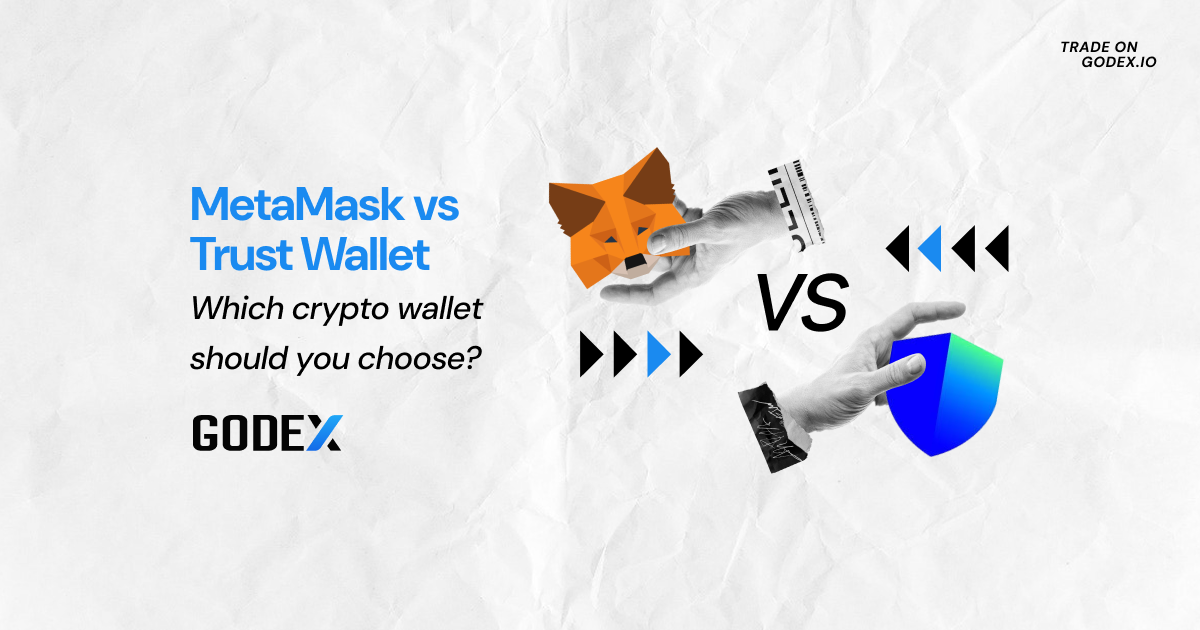Table of Contents
MetaMask vs Trust Wallet is a frequent dilemma for seasoned traders. Both make a great choice but still differ in may key points like security, availability, transaction fees, etc. In this piece, we dive deep into these wallets, providing their comparison, strong points and weaknesses.
You’ll get insights into each of them to make informed decisions about which to pick and use. Keep on reading as we explore everything you need to know about these mobile apps.
Introduction to MetaMask and Trust Wallet
Before getting down to the Metamask vs Trust Wallet correlation, let’s have a look at what they represent. The two of them offer unique features that cater to different needs. So, what sets them apart and why one might be more suited for you?
What’s the purpose of each? The ‘why’ of MetaMask vs Trust Wallet creation for the crypto world.
Trust Wallet, the official decentralized wallet of Binance, was created to provide a seamless and secure experience for managing a wide range of digital assets. Its purpose lies in simplifying access to cryptocurrencies for users while supporting an extensive ecosystem.
MetaMask, on the other hand, was created with a focus on Ethereum and its ecosystem. Originally developed as a browser extension for Ethereum-based applications, it has evolved into a versatile wallet available on both mobile and desktop platforms.
Supported Cryptocurrencies and Blockchains
Over 4.5 million tokens across 65 different blockchains are available via Trust Wallet, making compatibility broader than the one of MetaMask. This includes major cryptocurrencies such as Bitcoin, Ethereum, XRP, Cardano, and a wide array of others.
In contrast, MetaMask is primarily designed for the Ethereum ecosystem and is compatible with Ethereum-based tokens, including those following the ERC-20 standard.
Metamask vs Trust Wallet in terms of digital assets differs significantly. While MetaMask extends its functionality to networks like Binance Smart Chain, Optimism, and Polygon, Trust Wallet stands out by providing access to a significantly larger variety of digital assets.
Key Differences Between MetaMask and Trust Wallet
Which of the two you pick – it all depends on your needs. If you’re after multi-chain support and a broad asset range, Trust Wallet is the stronger option. If you prefer Ethereum and its decentralized applications, MetaMask offers unmatched versatility. Let us elaborate on that.
While MetaMask excels in its Ethereum compatibility, it has a more limited scope when it comes to supporting other blockchains. However, its dual-platform availability and strong integration with Ethereum-based services make it a preferred choice for DeFi enthusiasts.
Like Trust Wallet, MetaMask is a non-custodial wallet, giving users full control over their private keys and funds, with added security measures such as biometric authentication.
MetaMask – another highlight is its built-in dApp browser, designed to connect users with decentralized platforms such as PancakeSwap and SushiSwap. This feature makes Trust Wallet more than just a storage solution—it’s a gateway to the broader decentralized finance (DeFi) space.
Its user-friendly interface and strong security measures, including biometric authentication and non-custodial control, make it one of the most popular crypto wallets.
Trust Wallet tends to attract users who value broad compatibility and direct access to multiple blockchain networks. Its integration with Binance and user-friendly design further solidify its appeal, particularly among beginners and those exploring DeFi for the first time.
In Trust Wallet vs MetaMask dilemma, the latter is more popular among users deeply invested in Ethereum and DeFi platforms. Its robust functionality for Ethereum applications makes it a go-to for developers, traders, and Ethereum enthusiasts who require seamless access to the network’s ecosystem.
Pros and Cons of Trust Wallet
We should start from the biggest pro and the biggest con of this wallet. Obviously, what makes it stand out is its extensive asset support, which makes 4.5 million digital assets across 65+ blockchains. Thus, it highly versatile for diverse cryptocurrency portfolios.
In the meantime, the biggest con is its mobile-only access, which means desktop users are limited here and need multi-device integration for convenience. Let’s explor other pros and cons.
Pros of Trust Wallet:
- User-Friendly Interface
- Integrated dApp Browser
- Non-Custodial Security
- Staking and Earning Opportunities
- No Swap Fees
Cons of Trust Wallet:
- Limited Customer Support
- Dependence on Third-Party Services
- Potential Security Risks
Pros and Cons of MetaMask
Trust Wallet vs MetaMask all possess its pros and cons. The biggest advantage of MetaMask is that it excels in its seamless integration with the Ethereum ecosystem, providing users with direct access to a vast array of decentralized applications (dApps) and decentralized finance (DeFi) platforms.
On the other hand, its primary focus on Ethereum and Ethereum-compatible networks limits support for other major blockchains, such as Bitcoin and Solana, which may not meet the needs of users seeking a more diverse asset portfolio.
What makes it still a great option?
- User-Friendly Interface
- Cross-Platform Availability
- Non-Custodial Security
- Built-In Token Swap Feature
- Active Development Community
Why users shouldn’t opt for it?
- Swap Fees
- Manual Network Addition
- Potential Security Risks
Trust Wallet vs. MetaMask: Fee Structure
If compared Trust Wallet vs Metamask from fees perspective, users benefit more from Trust Wallet’s fee structure, especially concerning token swaps and staking, as it avoids extra charges beyond standard network fees. Trust Wallet includes charges between 3.5% to 5% for cryptocurrency purchases using fiat, depending on the payment provider. Metamask imposes a 0.875% service fee on token swaps, in addition to network fees.
When evaluating the fee structures of Trust Wallet and MetaMask, Trust Wallet generally offers a more cost-effective experience for users. Now, let’s compare the wallets from gain staking and swap fees.
Staking and Token Swap Fees
Trust Wallet allows staking without imposing extra charges, though third-party provider fees may apply. Speaking about token swaps, it facilitates token exchanges without additional fees, apart from standard network (gas) fees.
MetaMask utilizes external providers like Lido and Rocket Pool, which take a 14% and 10% cut from staking rewards, respectively. During exchanges, it imposes a 0.875% service fee on token swaps, in addition to network fees.
Download, Storage, and Transaction Fees
Trust Wallet vs MetaMask: Which is better? In terms of download and storage fees, they are the same.
Trust Wallet is completely free to download and install on mobile devices, with no associated fees for usage or wallet creation. Storage is managed locally on the user’s device, ensuring that there are no additional costs for maintaining the wallet.
Like Trust Wallet, MetaMask is free to download and use. It is available as a browser extension for desktops and as a mobile app, offering cross-platform flexibility without added costs for installation or wallet setup. Storage is also managed locally, ensuring no extra charges for wallet upkeep.
Speaking of transaction fees, Trust Wallett does not impose any additional fees for transactions such as sending or receiving cryptocurrencies. However, users are responsible for paying network (gas) fees, which are determined by the respective blockchain.
In contrast, MetaMask charges a 0.875% service fee for token swaps in addition to network fees. While sending and receiving cryptocurrencies doesn’t incur platform fees, users engaging in swaps may find these charges more expensive compared to Trust Wallet.
Security Features: Which Wallet Offers Better Protection?
Metamask Wallet vs Trust Wallet security, both do a great job in this direction offering strong non-custodial security features. Trust Wallet’s built-in biometric and auto-lock functionalities make it particularly user-friendly for ensuring asset protection. MetaMask provides equally robust protection. However, a user becomes more responsible here as they need to securely manage the seed phrase.
To compare, Trust Wallet and MetaMask differ in their protection features primarily in ease of use and user responsibility. Trust Wallet offers enhanced security with features like auto-lock and biometric authentication, making it user-friendly and secure for mobile users.
In contrast, MetaMask relies on strong encryption and seed phrase management, but its browser extension introduces potential risks, requiring users to be vigilant against phishing attacks.
Features Comparison: MetaMask vs. Trust Wallet
Trust wallet vs Metamask are compared via the following features:
- Supported Blockchains and Assets
- Platform Availability
- User Interface and Experience
- Security Measures
- Transaction Fees
To sum up, for users seeking versatility and ease of use, Trust Wallet might a perfect fit as it delivers broader asset support and a mobile-centric experience with cost-effective transactions.
However, those who ‘hnag out’ a lot in the Ethereum ecosystem, MetaMask is the best option. It provides robust integration with the Ethereum ecosystem, appealing to users focused on Ethereum-based assets and dApps, with the added flexibility of desktop access.
Conclusion
The dilemma which one to pick disappears once users define their priorities. If versatility and lower fees are your priorities, go for Trust Wallet. On the other hand, Ethereum users and those requiring desktop access will like MetaMask since it offers greater functionality within the Ethereum network.
Users should also prioritise the key features and qualify the wallets based on it. For example, you prefer security over user-friendly, then Trust Wallet wins over MetaMask. If you regard Trust Wallet vs Metamask fees and want to avoid extra ones, Trust Wallet is a better option as well.
Start a Cryptocurrency exchange
Try our crypto exchange platform
Disclaimer: Please keep in mind that the content of this article is not financial or investing advice. The information provided is the author’s opinion only and should not be considered as direct recommendations for trading or investment. Any article reader or website visitor should consider multiple viewpoints and become familiar with all local regulations before cryptocurrency investment. We do not make any warranties about reliability and accuracy of this information.
 Linda Larsen
Linda Larsen 
Read more
Ripple (XRP) price has been widely discussed by the cryptocurrency community since it has gained public interest in 2017, even though it was founded by Chris Larsen and Jed McCaleb years before. The platform offers innovative blockchain solutions for the banking sector and has the potential to disrupt the whole finance industry. In recent years, […]
In this article we will talk about Ripple (XRP) and its price prediction. What is Ripple (XRP) Ripple is a San Francisco-based startup that was launched in 2012 by Ripple Labs as a global network both for cross-currency and gross payments. Ripple history began in 2004 with the discussions around the digital coin in the […]
You may well think that an article dedicated to a Tether price prediction or the Tether price in general is a little bit strange — it is a stablecoin after all. However, the price of Tether does fluctuate significantly, although it is nowhere near as volatile as non-stablecoin cryptos. This means that staying up to […]
In the article we share our vision at Zcash cryptocurrency main features and add several price predictions. As cryptocurrencies gain global acceptance and decentralisation slowly enters our lives, privacy becomes the main concern when talking about blockchain adoption. It is no secret that distributed ledger is by far the most secure and transparent technology ever […]
Chiliz coin (CHZ) offers a compelling opportunity for traders interested in the intersection of blockchain technology and sports. By enabling fans to influence team decisions through the Socios app, Chiliz directly monetizes fan engagement and connects with major sports teams like Juventus and Paris Saint-Germain. These partnerships not only enhance the platform’s visibility but also […]
The exponential growth of Bitcoin Satoshi Vision (BSV) against the general bear trend on the cryptocurrency market in autumn 2019 has impressed the community. Due to the increasing market capitalization, the newly emerged altcoin was ranked 5th on CoinMarketCap and managed to maintain its high position at the beginning of 2020. In the article we […]